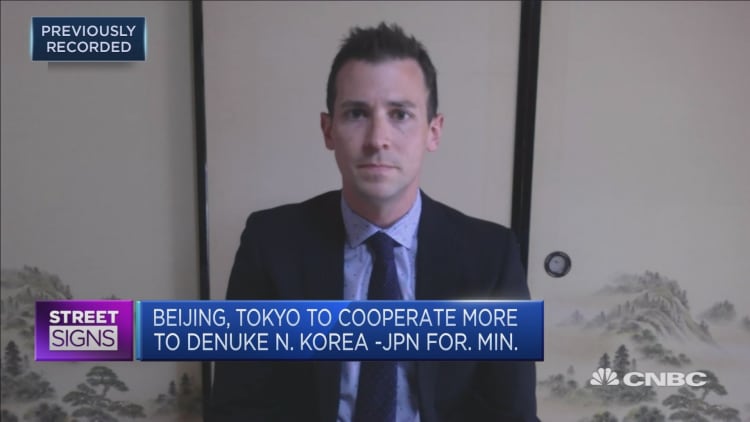
As sliding ratings threaten the political future of Japanese Prime Minister Shinzo Abe, the embattled leader is under pressure to prove that his relationship with President Donald Trump remains robust when the two hold a summit on Tuesday.
If Abe, whose reputation at home has been hit by multiple controversies, can prove that the U.S.-Japan alliance is strong in the face of trade tensions and North Korea talks — two issues important to Abe's re-election prospects — that could strengthen his domestic standing.
"Abe wants to return home with concrete evidence that the relationship has stayed out of the rough. The stakes are high for Abe's foreign policy agenda and potentially his political future," advisors at the Center for Strategic and International Studies (CSIS) wrote in a recent note.
The two leaders are due to sit down at Trump's Mar-a-Lago resort on Tuesday, and the mood is expected to be vastly different from the pair's last meeting there more than a year ago. Back then, the relationship was at a high point and likened to a "bromance." Now, their special connection appears to have fizzled out.
Tokyo is one of the few American allies that hasn't been exempted from Trump's steel and aluminium tariffs. Moreover, the U.S. president's decision to meet with North Korean leader Kim Jong Un without consulting Abe sparked fears of Japan being sidelined during nuclear negotiations — an alarming prospect for a country in immediate range of Pyongyang's missiles.
How the summit can help Abe
The summit comes amid mounting discontent over Abe's alleged involvement in two cronyism scandals and reports of a cover-up over Japanese soldiers in the Iraq War. A Nippon TV survey over the weekend showed the leader's support tumbling to 26.7 percent, the lowest level since he took office in 2012. And on April 14, tens of thousands of people took to the streets in Tokyo calling for his resignation.
One of his key cards has been his role as a global statesman and his influence on issues such as North Korea [and] his relationship with the U.S.Jonathan Berkshire MillerJapan Institute of International Affairs
Abe's chances at winning a third term in power in a September party election now appear uncertain. That win would put him on the path to becoming the country's longest-serving premier.
While the prime minister has been no stranger to scandals over the years, he's managed to stay in power without any real opposition because of his strong foreign policy stance, strategists said.
"One of his key cards has been his role as a global statesman and his influence on issues such as North Korea [and] his relationship with the U.S.," said Jonathan Berkshire Miller, senior visiting fellow at the Japan Institute of International Affairs. As cracks in both materialize, that's where the Mar-a-Lago summit becomes important, he continued.
Even when Abe was engulfed in a scandal during last October's general election, he still engineered a landslide victory "in part because the public recognized his leadership on national security issues in the face of the increased threat from North Korea and concerns about China's rise," the CSIS note said.
So, to survive the current political storm, it's key for Abe to ensure Japanese interests don't get sidelined when it comes to North Korea and trade at Tuesday's summit.
But can he succeed?
"One of Abe's strong suits has been his ability to reassure the Japanese public that his special relationship with the mercurial American president has helped Japan navigate the choppy waters of an 'America First' foreign policy," said Mireya Solis, co-director of the Center for East Asia Policy Studies at think tank the Brookings Institution.
But Trump, who is also facing controversy at home as investigators examine his 2016 campaign and more, may not want to yield any ground to the Japanese leader.
On trade for example, the White House wants to ink a bilateral agreement to gain greater access to Japan's agricultural and automobile markets. Tokyo, however, isn't interested.
"It is a well-rehearsed habit of Trump's to ramp up the rhetoric on trade when he's in a political pinch, to fire up his base," Solis warned. So ahead of the upcoming midterm U.S. elections, Trump "may feel that a tough posture on Japan opening its agricultural markets suits him best," she warned.
—CNBC's Bhawna Sharma contributed to this story.

